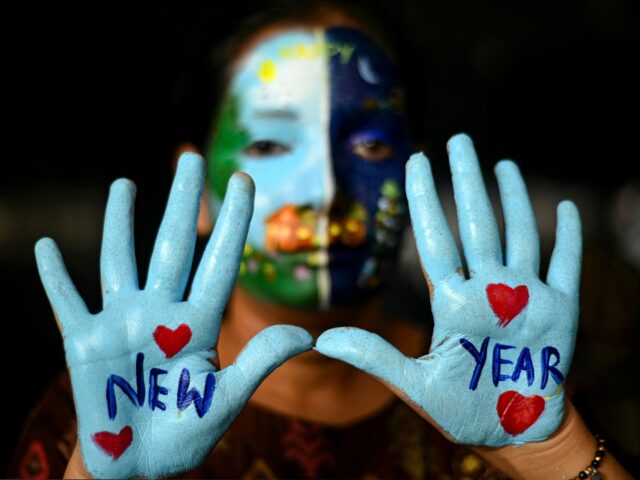The head of a prominent Islamic organization in India propagated a fatwa, or religious edict, this weekend prohibiting Muslims from celebrating the new year.
Maulana Shahabuddin Razvi Barelvi, the head of the All India Muslim Jamaat, lamented that new year celebrations typically encourage “dances, obscenity, hooliganism, alcoholism, [and] betting-like activities,” and called the new year a “Christian” holiday, citing the origins of the Gregorian calendar. The leader suggested Muslims focus on practicing their own faith, instead.
The All India Muslim Jamaat is a non-governmental organization associated with Barelvi Sunni Islam and has a history of supporting Hindu nationalist Prime Minister Narendra Modi, accusing opposition parties targeting marginalized Muslims of using “sectarianism” to hurt the Bharatiya Janata Party (BJP).
“The young men and women who celebrate New Year have been instructed that celebrating it is neither a matter of pride nor should it be congratulated,” Razvi said on Sunday. “The New Year marks the beginning of the Christian calendar year, the English Year, and celebrating any non-religious practices is strictly prohibited for Muslims.”
The Deccan Herald quoted Razvi as stating that, for New Year’s Eve, “dances, obscenity, hooliganism, alcoholism, betting-like activities are organised in hotels.”
“All these activities are banned in the Islamic Sharia. Any boy or girl found involved in these activities will be a culprit as per Sharia,” he emphasized.
As per the Gregorian calendar, the year 2024 – 2024 years after the birth of Jesus of Nazareth – will conclude on Tuesday. While initially instituted through the Vatican, the calendar’s months have their origins in the pagan Roman calendar, later modified as the science astronomy improved.
India is a majority Hindu country, not Christian, but New Year’s Eve celebrations are nonetheless common and expected nationwide. The Times of India compiled a list this year of some of the Indian cities known to host the biggest celebrations nationwide, including the capital, Delhi, and the major cities of Goa and Mumbai.
The Indian National Congress, the main opposition party in India, responded negatively to the fatwa, dismissing it as “rubbish.”
“People from different religions make such rubbish talks. These people defame their religions,” Surendra Rajput, the leader of Congress, told the Press Trust of India (PTI). “India is a country of unity in diversity. Every religion is respected here, festivals are celebrated together. There is no need to react much to such matters. They just want to benefit the ruling party through communal ways.”
In reality, India struggles with a high volume of religious violence, particularly on the part of Hindu nationalists and Muslim extremists. Under Modi, the incidents of Hindu nationalist mob violence, particularly against Christians, has skyrocketed, leading to atrocities such as the gang-rape of Christian women and displacement of thousands of people.
Modi actively denies all instances of religious persecution. When asked about the crisis during a visit to the White House in June 2023, Modi said he was “really surprised” anyone would claim religious persecution exists in India because “there’s absolutely no space for discrimination.”
Muslims around the world follow the Hijri, or Islamic calendar, a lunar model that also consists of 12 months. The Islamic calendar is currently in year 1446, which will conclude in mid-2025.
Muslims around the world approach celebrations of the Gregorian new year in different ways, though most agree that religious celebrations of the “Christian” new year are haram or forbidden. Whether New Year’s Eve counts as a secular celebration or not remains a matter of debate, as Islam also recommends Muslims maintain friendly relations with those of other cultures.
“Congratulating non-Muslims on their religious or non-religious feasts and exchanging gifts on these occasions is part of the good relations that we are commanded to keep with them,” Sheikh Muhammad Al-Mukhtar Ash-Shinqiti, a professor at Qatar University, explained in response to a question about celebrating the new year before 2024. Those relations are especially encouraged, he added, “if those non-Muslims congratulate and exchange gifts with us on our Islamic feasts.”
The All India Muslim Jamaat is far from the only Islamic organization discouraging celebrations of the new year, however. In Aceh, Indonesia – a region governed explicitly by sharia, or Islamic law – the city government of Sabang banned new year celebrations this weekend.
“We urge all community members to avoid any outdoor or indoor New Year celebrations,” Mayor Andri Nourman announced. “These include firecracker displays, sounding trumpets, consuming alcoholic beverages, mixed-gender gatherings, motor racing, and other activities that violate Islamic teachings and Aceh’s local customs.”
In past years, the governments of several Islamic nations have similarly outlawed new year festivities. In anticipation of 2013, imams in Kyrgyzstan issued a fatwa banning new year parties, proclaiming, “it is not related to Muslims at all.”
Prior to 2016, Tajikistan similarly banned New Year’s “festive meals” as well as Christmas trees and other Christian-related items as a measure to stop the spread of “Western” cultural practices.
Follow Frances Martel on Facebook and Twitter.

COMMENTS
Please let us know if you're having issues with commenting.